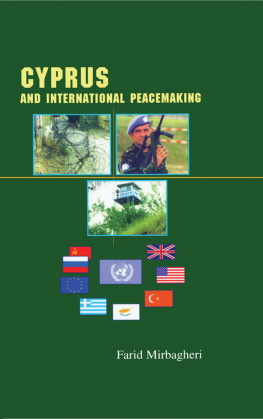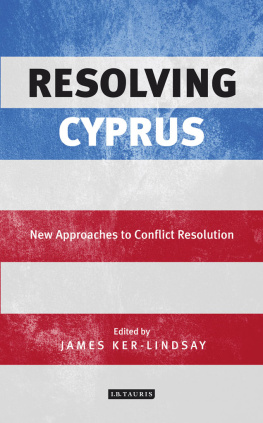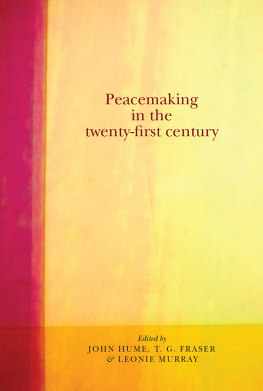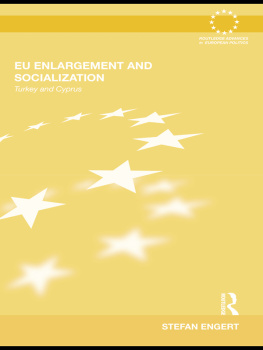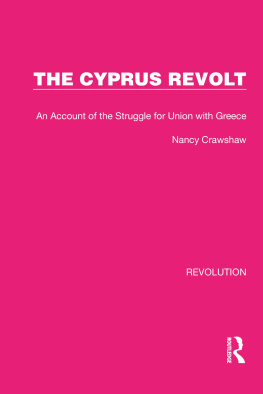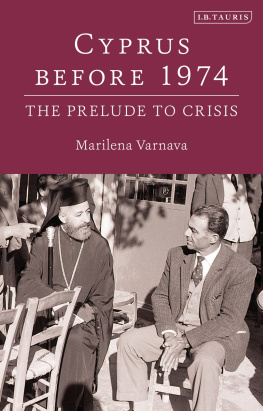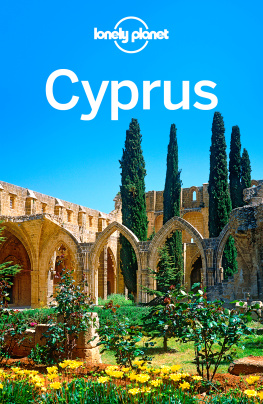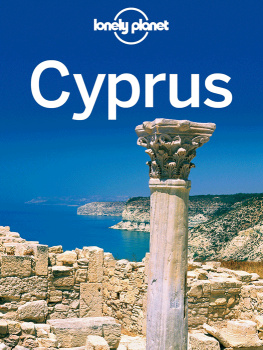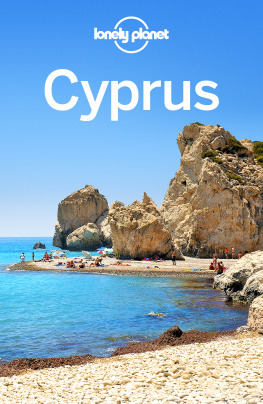First published in 1998 by
Routledge
711 Third Avenue
New York, NY 10017
Routledge
2 Park Square, Milton Park
Abingdon, Oxon, OX14 4RN
1998 by Farid Mirbagheri
All rights reserved. No part of this book may be reprinted or reproduced or utilized in any form or by any electronic, mechanical, or other means, now known or hereafter invented, including photocopying and recording, or in any information storage or retrieval system without permission in writing from the publishers.
Cataloging in Publication data available from the Library of Congress
ISBN 0-415-91975-4
Cyprus is the third largest Mediterranean island. It is situated south of Turkey, west of Syria, north of Egypt and east of Greece. It covers 9,251 square kilometres and has a population of around 800,000. Its history spans nearly 8,000 years a turbulent story of conquest for some and defeat for others. The two main communities are of Greek and Turkish origin, 80 per cent and 18 per cent respectively. The remaining 2 per cent is composed of Maronites, Armenians and others. Since 1945, Cyprus has been deeply affected by the animosity between the two mother countries, Greece and Turkey. The Cyprus problem has been on the international political agenda for more then three decades. Despite numerous international efforts to find a peaceful resolution the conflict is still very much alive in the 1990s.
There are many facets to the problem, but two are especially notable. The first is internal: the inability of the Greek and Turkish communities in Cyprus to agree on a solution that safeguards the interests of both. The second aspect is international: the involvement of Greece, Turkey and Britain (guarantor powers of the 1960 Cyprus independence constitution) in the dispute. Because of this, and because of old rivalries between Greece and Turkey and the consequent risk both pose to international peace and security, Cyprus has received and continues to receive international attention seemingly out of proportion to its size and population.
This book deals with international peacemaking efforts to resolve the Cyprus problem between 1964 and 1986 and investigates why they failed. It covers the attempts of the United Nations and various states, including the United States and Britain. It focuses particularly on the question of intercommunal mistrust as an important contributing factor, which some believe lies at the root of the problem, and which showed itself in the first three years of the Republic of Cyprus, 19603. As one observer noted, In the disputes over the application of the Zurich and London agreements, a heavy burden of mutual suspicion and fear had been created.1
The book consists of six chapters. The first deals with the experience of the UN in peacemaking generally, with some observations on its efforts in Cyprus in particular. Since the UN has been the main agency entrusted with bringing about a peaceful solution and an agreed settlement to the Cyprus problem, the first chapter outlines the role and the capacity of the world organisation as the global peacemaking body. deals with the most crucial events of the modern period: the Greek-staged coup in the island in 1974 and the subsequent invasion by Turkey. These events changed the balance of forces in Cyprus, and as a result international peacemaking efforts started on a new basis. The efforts of outside powers, namely the American-British-Canadian initiative in the late 1970s, and the two intercommunal High-Level Agreements of 1977 and 1979, are outlined. The sixth and last chapter covers the seven years 19806. Unquestionably this period witnessed the most active UN peacemaking efforts in Cyprus. Perhaps this was partly due to the arrival in 1982 of a new UN Secretary-General, Javier Prez de Cullar, who had first-hand knowledge of the Cyprus problem, having been the special representative of the UN Secretary-General in Cyprus in the 1970s. Also during this period there were signs that the United States government fully and actively supported the UNs endeavours to bring about a peaceful solution. In the conclusion an effort is made to analyse the whole international peacemaking effort in Cyprus between 1964 and 1986, relating it to the difficulties posed by the intercommunal mistrust on the island and to the role of interested outsiders. The conclusion also proposes a way forward for peacemaking in Cyprus, by indicating how its weaknesses could be overcome and how the opportunities for a peaceful solution could be enhanced.
Notes
Robert Stephens, Cyprus A place of Arms, London: Pall Mall Press, 1966, p.182.
Acknowledgements
I am indebted to a number of people for their help in completing this book. First, I owe thanks to my parents for supporting me wholeheartedly throughout the years I have been studying. Without their generous and uninterrupted support, financial and otherwise, this work would have been impossible. I shall never be able to thank them enough. Professor Alan James, research professor and former head of the International Relations department at Keele University, has played a crucial and indispensable role in the completion of this study. As my principal supervisor, his comments have been pivotal; he also facilitated my visits to various United Nations centres and I shall be indebted to him all my life. I would like to thank deeply Dan Keohane, senior lecturer in the International Relations department, Keele University, who as my acting supervisor devoted much time and effort to assisting me, and this study has benefited from his comments and guidelines. I also thank Christopher Brewin, senior lecturer in the same department, for helping with comments on the earlier part of this work.
A number of people granted me the opportunity to interview them and helped me with my inquiries. Some of them do not wish to be identified but I wish to express my thanks and appreciation to all of them, and to others with whom I corresponded. I must mention by name Mr Glafkos Clerides, President of Cyprus; Mr Ozker Ozgur, former leader of the Turkish Republican Party; Mr Sotiris Georgalis of the Cyprus High Commission, London; Mr Alpay Gench, formerly of the Office of the Turkish Republic of Northern Cyprus ; Mr Martin Wattam, formerly of the Information Centre in London; the late Brigadier Michael Harbottle; Mr Charles Goulkin, former Spokesman of UNFICYP; Dr Peter Loizos, London School of Economics; Professor Glen Camp, Bryant College, Rhode Island; and Dr Carl Grundy-Warr, formerly of Durham University.
I would also like to thank all those with whom I communicated about this work.
I owe thanks to many institutions, including Keele University Library; the British Library in London; the Public Records Office at Kew; the Public and Information Office, Nicosia; the Cyprus Research Centre, Nicosia; the United Nations Information Centre, London; the United Nations Library, Geneva; the Archives Unit, United Nations, New York; the Cyprus High Commission, London; and the Royal Institute of International Affairs, Chatham House, London.
Last, but not least, I express my deepest gratitude and highest regard to my wife, Maria. I thank her for offering impartial advice on the sources I have used and facilitating some of the interviews, also for the frequent lonely hours that she endured while I was engaged on this work. But most of all I thank her for the love and vital support that kept me persevering even at the most difficult times.
Understandably, some of those who I interviewed or who otherwise assisted me may disagree with some or all of the contents, but this in no way lessens my gratitude to them. The book gives my own interpretation of events and I alone am responsible for any errors, factual or otherwise.


